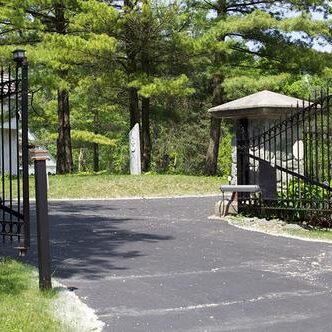Residential driveways are commonly made from either asphalt or concrete, and each material is preferable in certain situations. Here’s a look at the advantages of asphalt and of concrete, along with when you might use either one.
Budget: Asphalt Costs Less Than Concrete
If budget is your primary consideration, asphalt driveways cost less to put in than concrete ones do.
An asphalt driveway generally costs between $2 and $5 per square foot, while a concrete one usually runs between $3 and $10 per square foot (and sometimes can be even more). While a few dollars per square foot might seem relatively minor, the difference in cost becomes significant when calculated over the surface area of an entire driveway.
A fairly typical driveway might measure 12 feet by 50 feet, or 600 square feet in total. This size driveway would cost between $1,200 and $3,000 if paved with asphalt. A concrete driveway would cost hundreds or thousands more. It’d be between $1,800 and $6,000 in total.
This difference in cost is why many homeowners choose to have an asphalt driveway. It’s a great solution for entry-level homes that have relatively low values, investment properties where costs should be kept as low as possible, and for anyone who wants to spend less on a driveway.
Maintenance: Asphalt Requires More Frequent, But Less Intensive Maintenance
Asphalt driveways and concrete driveways have different maintenance needs, but those needs even out. An asphalt driveway will require more frequent but less intensive service, while a concrete driveway will be fine for a while but then will have to be fully replaced.
Asphalt driveways should be resealed about every three years. This gives them a new coating of asphalt, and it has both a functional and an aesthetic purpose. The sealing fills in cracks and helps maintain the strength of the driveway. It also covers up spills and stains, making the driveway look like it’s new.
When applied to an asphalt driveway, the sealant used can make significant repairs to existing asphalt. Even deep or long cracks can frequently be fixed by sealing an asphalt driveway.
Concrete driveways don’t require the three-year upkeep schedule that asphalt driveways do. A concrete driveway will last for years with no maintenance, just as concrete buildings stand for years with no attention given to their foundations or exterior walls.
Concrete driveways can’t be repaired as easily as asphalt driveways can, however. While they’re less likely to break down, large cracks in concrete driveways can’t be fixed. Even fixing small ones often leaves unsightly patches. Thus, a broken-down concrete driveway typically must be fully replaced.
Weather: Asphalt Holds Up to Changing Seasons
The elasticity of asphalt and concrete make the materials suitable for different types of weather.
Asphalt is somewhat elastic. While you can’t see the material shrink and expand, it will shift slightly when conditions change. This lets asphalt respond to changing weather well, as it’ll contract during winter’s cold temperatures and expand during summer’s hot temperatures. The elasticity helps prevent asphalt from cracking simply due to seasonal changes.
Concrete is a rigid substance that won’t contract or expand. Instead, it’ll crack when extreme temperature changes force it to shift. This can lead to deep or long cracks appearing during seasonal shifts. Concrete is a more lightly colored material, however, and it won’t absorb bright sunlight easily. This keeps concrete cooler during extremely hot summer afternoons.
If you’re in a region where seasons change frequently, an asphalt driveway will be better suited for the climate. If you’re in the South, where temperatures can get into the triple-digits during summer, a concrete driveway will be less hot.
Should you need help installing or repairing an asphalt driveway, contact Arrow Black Top & Masonry, Inc.

